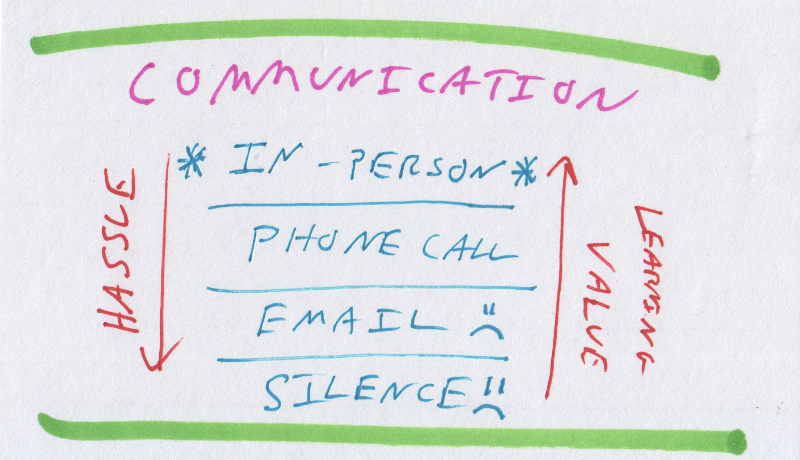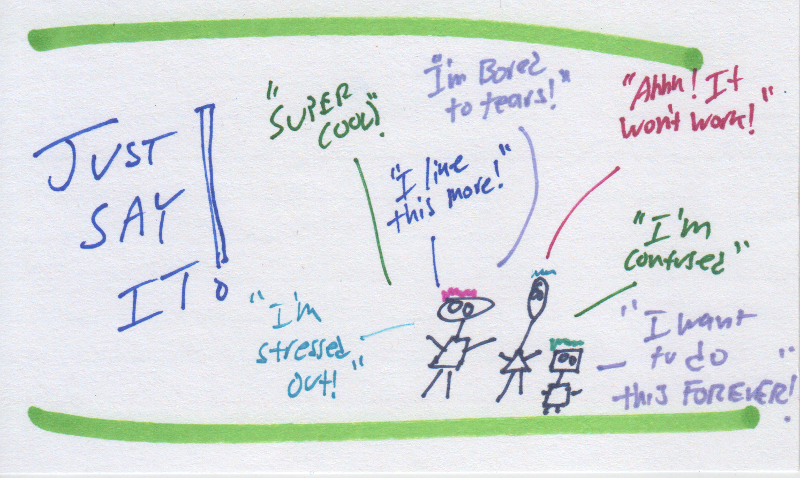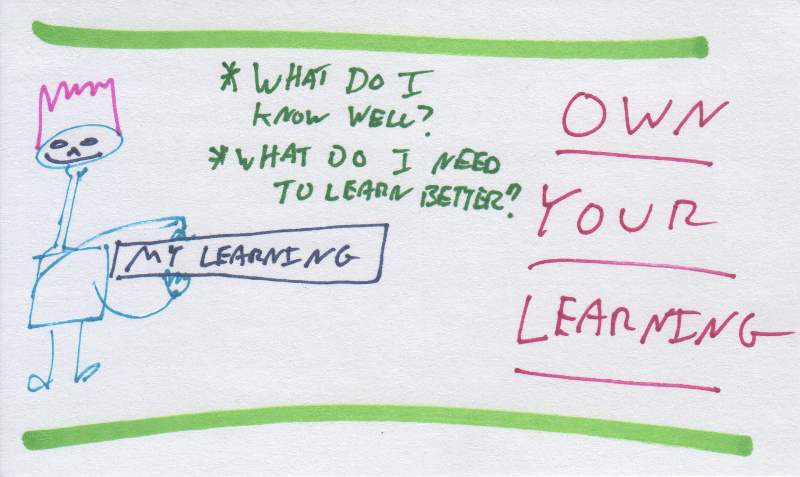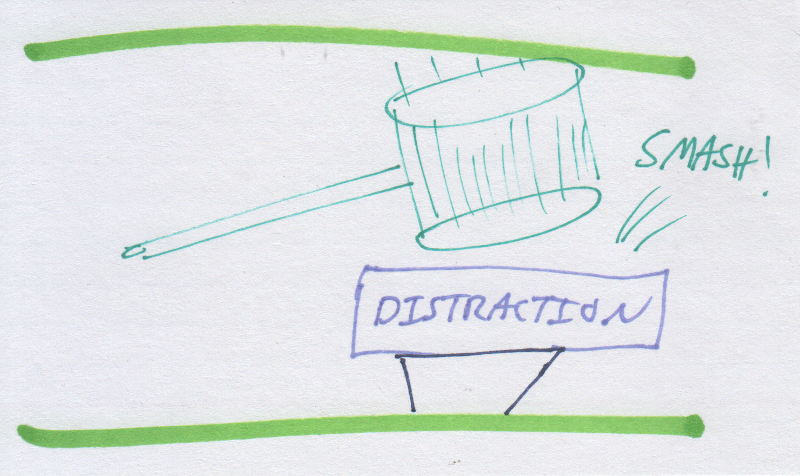
Syllabus CIT-100 ONLINE: Computer Fundamentals and Applications
Course Syllabus: Fall 2018 | Instructor: Eric Darsow
Community College of Allegheny County
Jump to a section
No required textbook! Wahoo!
Many CIT-100 students are asked to buy a $150+ book that is basically one thousand pages of "click here, then click here" for Microsoft Office programs. All of this content is available on the Internet, for free. So, We'll opt for the free stuff in this course and leave the expensive books for the micro biology folks whose info isn't already on the internet.
Technologyrediscovery.net is your home for course content. We will use a BlackBoard course site for tracking attendance and work completion, as well as to post announcements, etc. All announcements will be cross-linked between technologyrediscovery.net and the Blackboard site.
We'll prioritize resources that are available for no charge on via the Internet, all of which will be linked via our session pages linked on the course schedule. No need to buy the assigned text associated with this course since it's not very useful for most students. If there is important content from the text, your instructor will post a reference to it or summarize it within our course documents.
Computer requirements
This course is designed for students running the Microsoft Corporation's Windows operating system and the Microsoft Corporation's MS Office 2016 suite of applications. Many of the concepts explored in this course, however, apply to all modern computer systems and all modern office software packages.
Given that computers come in many shapes and sizes, you are not required to own or use a computer running the Microsoft Corporation's software, but if you are a student who prefers to have directions match your computer exactly, you'll want to gain access to a Windows system either on your own or by using a CCAC computer lab.
So what do I actually need, specifically?
Can I use a mac?
Probably, but only if you don't mind the step-by-step instructions being a little different for you. Modern PCs and Apple computers both run something called an i386 chipset and thus both work in essentially the same ways. You can also install LibreOffice and Microsoft Corporation's Office suite on Apple computers. You can also use Apple's native Office suite, BUT the instructions and screen shots will not correspond to your system.
Can I use a ChromeBook?
Not for everything. You'll probably find working only on a ChromeBook for this course frustrating since the file explorer system and command line interface is unlike MS Windows or OSX. Also, you cannot install Libre Office Base on a ChromeBook, so you'll need at least a few weeks of access to a "normal" PC.
Free, short-term access to Microsoft software
As a student at CCAC, the Microsoft Corporation will grant you a student-use license for the Office 360 suite. Information on installing this software using the Microsoft software control system called Imagine is available on the CCAC Technology Services website.
Microsoft users beware!
NOTE that as soon as your student status at CCAC ends, the Microsoft Corporation will revoke your Office 360 license and the software you had installed on your computer will no longer perform any essential functions and any information you may have stored in their OneDrive cloud system will become inaccessible. At this time, you will be required to pay for a recurring non-student license that costs $100 per year until the day you die.
Libre Office is free, and just as good as MS Office
If you would like to use free and open source technology to learn computer fundamentals, you can download and install a fully featured office suite called Libre Office which costs zero dollars and the license will never expire or convert into a paid license. Libre office is available for free download onto Linux, Windows, and OSX systems and the suite contains tools that mirror all of the MS Office functions required for this course.
Overall Course Learning Objectives
At the end of the course, students will be able to
| check_box | Think and design like designers of computer systems think and design: in terms of components and how they work with other components to get something useful done for the user (i.e. load a website) |
|---|---|
| check_box | Create structured documents to present useful data (information) electronically and in print to other humans |
| check_box | Comfortably oragnize, manipulate, and share data using a spreadsheet! We shall not fear spreadsheets! |
| check_box | Navigate computer operating systems, specifically its file system, to run application software |
| check_box | Become best friends with the most comprehensive and up-to-date source of sources on the internet: Wikipedia |
Course Info
| Category | Content |
|---|---|
| Registration Classification |
Number and Title: CIT 100 - Computer Fundamentals and Applications |
| Catalog Description |
This is a general computer literacy course. Students learn computer fundamentals (hardware, software and using a Microsoft Windows operating system), essential applications (word processing, spreadsheets, database and presentation software), working online (networks, using the Internet and email) and the impact of computing and the Internet on society. Students develop skills with common applications to use a computer as a tool, make informed decisions concerning computer generated information and obtain basic information systems concepts and terminology. |
| Prerequisites | None! |
| Sections |
Online: No face-to-face meetings required
CIT-100-Z03N (0332853) Comp Fund/Applictn |
| Instructor Information |
Eric Darsow |
Learning Outcomes
The following content is extracted directly from the CCAC master course syllabus for CIT 100:
The learning outcomes are consistent with the requirements of IC3, an industry-recognized certification program that covers a broad range of computing knowledge and skills to prove competency in essential computer areas. The Internet and Computing Core Certification (IC is a global, validated, standards-based training and certification program for basic computer and Internet knowledge and skills. Upon successful completion of the course, the student will:
- Computer Hardware:
- Identify different types of computers, how computers work (process information) and how individual computers fit into larger systems.
- Identify the function of computer hardware components and common problems associated with individual components.
- Identify issues relating to computer performance and how it is affected by different components of the computer.
- Identify the factors that go into a decision on how to purchase a computer or select a computer for work, school or home.
- Computer Software
- Identify how software works and how software and hardware work together to perform computing tasks.
- Identify different types of software, the tasks for which each type of software is most suited and the popular programs in each software category.
Course Philosophy
As a 100-level introductory course, this class is structured to provide students with exposure to a variety of core concepts relating to computer technology today. The fun part about this process emerges from the clever and intriguing nature of how computers actually work as systems to accomplish very complicated tasks--both computationally (crunching numbers) and coordinationally (connecting computers through the internet).
As an overview course, we will not dive into any one topic, nor will students be expected to memorize and repeat back facts or ideas related to individual subject areas. Rather, we'll work to understand the interaction between parts and find elements of the systems that are of interest to each of us and explore those through mini projects.
Attention will be directed at so-called office productivity applications such as word processors, spreadsheets, databases, and presentation tools. To develop a strong foundation for learning about these essential software packages, we'll learn about operating systems and how they function as a platform on which the software we all know and love rest.
Online Course Norms
Even though we are distributed in our structure, we can still consider our class like a mini-community of folks who are working on a project together, in this case, we're learning about computer fundamentals. I've done some thinking about how we can work together and stay happy while doing so, and propose the following group norms which hopefully can become shared values by class members. To avoid blobs of text, I've made little cards describing the norms so we can discuss them in class.




Online Course Structure and Procedures
As an online section, we have no in-person meeting times at any campus. This is convenient, since you can do course work for this class anytime you want, anywhere you want as long as you have a non-phone computer and the Internet.
The course is organized by week, and each week's learning is laid out in our class session guide page linked here.. Each week runs from Monday through Saturday. You should NOT plan on completing course work for this class on Sundays, since this is when your instructor reviews the work products from the week, posts comments (either written or via video), and finalizes content for the upcoming week.
In other words, your course work should best be done by about midnight each Monday. I'll try my best to make sure Blackboard quiz links and such do not disappear at some random posted time. If for some reason they do disapear, please email me or leave a vm at the shop and I'll turn it back on for ya'll. In other words, this is not a "hard" deadline. Sometime around midnight will work out just fine.
Getting help
If you can come to one of Eric's office hours at either North campus or West Hills, please do so. No need to make an appointment. Office hours are posted on the contact page. Since this is an online course, you are not assumed to have in-person access to any CCAC facilities.
A downside to online courses is that you don't have a regular face-to-face meeting time where feedback and learning guidance can be offered in real-time. This means you must seek out help on your own. The best way to get help from the instructor is to call the Technology Rediscovery shop land line at 412.894.3020. The best times to call are posted on the home page's contact section.
Our course will culminate in the creation of a final project to share with the world on the Internet. (You can feel free to request that your project not be posted, but are encouraged to do so and contribute to others' learning in the future. We'll devote the last two weeks of the course to your final project.
Weekly course work
This course will run on a weekly schedule: with our week starting on Tuesday and running through the next Monday. We'll explore a single topic each week which will result in you creating one mini-project or document to share with the world on our shared cloud drive.
After you post on the cloud drive, you'll complete a simple "I turned it in" assignment in Blackboard so your instructor can track your progress over the term and provide direct feedback on completed work.
If you are not posting anything I don’t hear from you, I’ll likely call you to see if you're okay or if I can be of assistance. Please make sure that the phone numbers listed in your student information are correct, and that if you have a cell phone that you'd like to be called on that this number is marked "cell" in the database.
"Late work"
The ORDER in which we learn stuff certainly matters a lot, but exactly WHEN a particular chunk of learning happens doesn’t impact the quality of that learning. With this principle in mind, I accept all assigned work up until the day before CCAC’s college-wide grade submission deadlines (for the mid-term grade and final). This allows for life disasters and such to happen without inducing panic.
Procrastinators beware!
This relaxed work policy can backfire in a hurry if you think it means you can slack off until the last minute. Use this as a test: can you set a reasonable work schedule and keep to it?
Keeping pace with the class, however, is likely to be very important to your learning process. For example, what we learn in week 4 is an extension of what we we’ll study in week 3. If you have put off doing out-of-class practice, you won’t be comfortable with week 3 stuff and you’ll likely be confused by the new content, and this is do doubt frustrating for everybody involved. So do yourself a favor, and, when possible, schedule out regular time to practice our class skills and work through exercises.
If you are falling behind, please reach out for help before stuff stacks up. I'll also contact you if I think you're getting too far behind using the contact info you provided CCAC when you registered.
How to credit outside resources
Most of the course projects from past students is released to the public through our course shared cloud drive.. What this means is that you could very well short-cut your own learning by basically free-riding off work other students have done and slapping your name on it.
This will not only turn your brain to mush, but it is DISHONEST to use others' work and not give them appropriate credit.
You are encouraged to reference other folks' work, and get help on your own work, but be sure you are doing the thinking, and you give credit to others who have helped you with that thinking. Make a small note at the end of a document you submit, and note it in your weekly blackboard work submission step.
Habits for Meaningful Learning:
- Deliberately practice developing your skills independently and/or in groups – outside of class – a few times a week. Practice distraction free: silence phones, use music sparingly, and work somewhere you can focus.
- Think of computer tools as instruments that can create their version of “music.” Treat them as such and learn your instrument’s ins and outs. Learn how it works on the inside as much as you can—even if it doesn’t seem immediately relevant. It will pay off big time in the future when you have to get it to do new things.
- Monitor for yourself what you don’t yet understand or can’t yet do and systematically exert effort to understand that stuff or do those things.
- Tinker with your tools, and break stuff (code, applications, operating systems, networks) and figure out how to fix it. This is the advantage to learning computers—breaking them doesn’t cost anything like it does in, say, woodworking, where messing up means wasting wood.
- Honor important waypoints in your learning process. (“When it really counts, make it happen.”) by being fully prepared for checkpoints and work sharing events presentations, etc.
- Make explicit note of any learning aids you use (“cite your sources”) during any work you do in this course. Include links to code you heavily reference and make happy note of major breakthroughs you made on your own.
Checkpoints (not tests!):
This course will not involve tests that are high pressure, completed entirely independently, and heavily weighted. Rather, the course is designed to encourage and support regular practice which leads to incremental learning. Many courses that heavily weight tests end up encouraging students to cram in content learning directly before each major exam, and this often detracts from the regular practice that is likely much more important to becoming a proficient computer user.
In this spirit, we will have a few checkpoint tasks to practice and show off your evolving skills and to communicate with me about your learning progress so I can support you as much as possible in meeting your educational goals.
The mini-project for the checkpoints should take approximately 2 hours to complete and will demand that you apply all of the core concepts learned in the course up to that checkpoint time. (Languages are by definition cumulative, so what we learn during the second class period, for example, will be required for all future classes and checkpoints).
You will receive written or verbal feedback on your checkpoint program within a week of its completion.
Course Letter Grades
Core assessment principle: The most important outcomes of the course is the degree to which students are comfortable implementing their new skills and knowledge in “real world” situations (i.e. to solve meaningful problems). This will be assessed through a review of the work you post on our course upload repositories.
This course uses a standardized grading procedure that aligns with CCAC’s college-wide grading policies which require teachers to issue each student a cumulative course grade of A,B,C,D or F. Both the student and faculty handbooks associate each letter grade with the following performance-related words:
- A – Superior (4)
- B – Above Average (3)
- C – Average (2)
- D – Below Average (1)
- F – Failure (0)
Suggestions for successful technical learning
We are working to learn how to use a computers—really fancy adding machines—to help us do stuff that’s useful like organize, store, and present data. Since computers are very complicated, successful learning should adapt to this environment. The following principles can be thought of as suggestions for building your computer knowledge and are based on my experience learning many new technical topics from scratch over the past few years:
- Find a book, tutorial set, or other learning resource that applies to the topic you’re studying and devour it all. Avoid skipping around and switching resources once you have found one that works with your learning style. This will help maintain a steady learning path and increase the quality of your knowledge.
- Locate the technical documentation for any tools you are using and study it carefully. These materials are usually written and published by the creators of the tools themselves. Become intimately familiar with the way the documentation is structured so you can find the information you need quickly when the moment arises.
- Expect your learning to spiral upward as you learn more and more about the important topics that are connected to your study. Since topics are often interrelated and complex, expect that you’ll need to be exposed to the same topic or idea a few times before it soaks in.
- Find a mentor or friend whose a little more proficient in the system than you are—as him/her/them questions often. Soak up what they know whenever possible. Work together when possible.
- Challenge yourself by not asking for help the moment you get stuck—tinker a bit. Experiment with a solution and see if it works. Working through confusion is an incredibly meaningful step in technical learning, since once you’re doing paid work, you’re expected to know how to solve problems.
Accommodations for Individuals with Disabilities:
The college recognizes its responsibility to provide academic and nonacademic services and programs equally to individuals with and without disabilities. To this end, the college provides reasonable accommodations for qualified students and employees with documented disabilities consistent with the requirements of the Americans with Disabilities Act, sections 503 and 504 of the Rehabilitation Act and other federal, state and local laws and regulations. The college maintains an Office of Supportive Services at each campus location to receive, review and evaluate requests from students who require an accommodation with respect to their educational program. Students’ requesting reasonable accommodations due to a documented disability must first register with their campus’ Supportive Services Office and obtain an official letter identifying approved accommodations to be distributed to their faculty members.
Attendance Procedure for Pregnancy and Pregnancy Related Conditions:
In accordance with Title IX of the Education Amendments of 1972, absences due to pregnancy or related conditions, including recovery from childbirth, shall be excused for as long as the absences are determined to be medically necessary. Students will be provided with the opportunity to make up any work missed as a result of such absences, if possible. For more information or requests for accommodations, students should inform their instructor(s) and/or contact the Civil Rights Compliance Officer/Title IX Coordinator, Sumana Misra-Zets, at 412.237.4535 or smisra@ccac.edu.
Attendance Procedure for Religious Observance
The college will make reasonable efforts to accommodate students who must be absent from classes or miss scheduled exams in order to observe a religious holiday or participate in some other form of religious observance. Students shall be provided, whenever possible, reasonable opportunity to make up academic assignments missed due to such absences, unless doing so would create or impose an undue burden on other students or the College. It shall be the students’ responsibility to provide written notice via the Request for Accommodation for Religious Observances Form (accessible at https://www.ccac.edu/nondiscrimination/) to every instructor for each course in which an accommodation is being requested. For more information contact the Civil Rights Compliance Officer/Title IX Coordinator, Sumana Misra-Zets, at 412.237.4535 or smisra@ccac.edu.
Chosen First Name Procedure for Students
Many individuals use names other than their legal first name to identify themselves for a variety of personal and/or cultural reasons. The college seeks to provide an inclusive and non-discriminatory environment by making it possible for students to use a chosen first name on college records when a legal name is not required. Chosen first names may not be applicable in certain programs due to the requirements of accreditation organizations and clinical sites. For more information, please see the Student Handbook